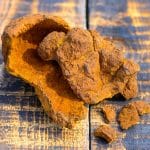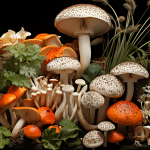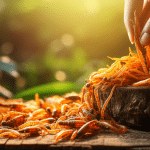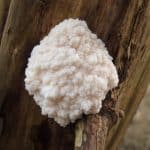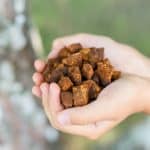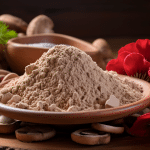After an extended training session, it is very common to feel tired and have aching muscles. Long periods of exercise are good for both your physical and mental well-being, but your body needs time to rest and repair itself after a period of temporary inflammation caused by hard training. Thankfully there are anti-inflammatory mushrooms that can help.
Functional mushrooms can aid the recovery process and aid inflammation in the body following exercise. Read on for details about the top four anti-inflammatory mushrooms to lower inflammation, improve endurance, and ease recovery.
Top 4 Anti-Inflammatory Mushrooms
1. Cordyceps Mushroom
Cordyceps mushrooms have a long history of being used by Chinese and Tibetans for improving respiratory health, as well as increasing energy and endurance in those living in higher elevations. This reputation is supported by recent studies showing cordyceps has a positive impact on the body’s ability to use oxygen efficiently. This mushroom enhances athletic performance by increasing oxygen availability to the body.
Cordyceps also has anti-inflammatory qualities. While short-term inflammation is a normal consequence of heavy training, chronic inflammation is detrimental to the body. Cordyceps may be helpful for managing inflammation and returning your body back to normal faster after exercise (it may even be a valuable supplement for your pre-workout routine, learn more about how to use it here!).
Learn more: Most nutritious mushrooms
2. Reishi Mushroom
Reishi is a powerful mushroom traditionally used for assisting in fatigue, increasing lifespan, and supporting the immune system. Studies have shown Reishi increases the beneficial activities of the immune system, helps regulate blood sugar levels, packs in lots of antioxidants, and shows potent antiviral and antibacterial activities. These broad-ranging benefits may contribute to improved health in general, but it is reishi’s antioxidant components that make it particularly valuable in recovering from physical exertion. Long-term exercise can cause oxidative stress due to the body’s own free radicals, but antioxidant-rich foods and supplements can help combat the detrimental effects of oxidative stress.
3. Antrodia Camphorata
Antrodia camphorata, a native of Taiwan, has been used traditionally for promoting energy and liver health. Because it has a significant antioxidant content, antrodia camphorata can aid in the fight against post-exertional oxidative stress. It has also been shown to aid in fatigue following hard training, making it an excellent choice for post-workout supplements.
4. King Trumpet Mushroom
King boletes are packed with antioxidants, particularly the essential nutrients ergothioneine and selenium. These mushrooms have been shown to support healthy cholesterol levels and aid in weight loss, while also having a positive impact on bone health.
It is a known fact that regular exercise helps to keep your weight in check as well as building stronger bones and muscles. Using the king trumpet mushroom as a supplement in an exercise routine may help maintain these benefits, as well as help recover from oxidative stress, providing essential antioxidants.
Learn more: How to tell if mushrooms are bad?
Add Anti-Inflammatory Mushrooms to Your Health and Fitness Routine
There is a lot of evidence to suggest that Functional Mushrooms promote general well-being, as well as helping the recovery process from hard physical training. But when is the best time to consume mushrooms after a workout to maximize recovery? Military soreness typically hits a maximum 24-72 hours after the period of exertion, so consider using mushrooms immediately following your workouts for help supporting your recovery process.
There are a number of mushroom complex powders and capsule products available, which provide powdered versions of individual mushrooms, should you wish to consume either cordyceps or reishi on their own. For even greater benefits, try a mix, which blends king bulla, cordyceps, reishi, and anthrodia camphorata into one potent fungus powerhouse.
Simply scoop out and mix powder into your juice, water, or your post-workout snack. Don’t have the time to stir the powder into your food or drinks? Try the handy capsules instead, and keep your body recovering after hard workouts.







